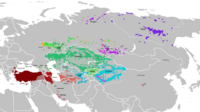|
Jie language
Jie (simplified Chinese: 羯语; traditional Chinese: 羯語; pinyin: Jiéyǔ[5]) is an unclassified extinct language formerly spoken in northeast China during the Later Zhao dynasty by the Jie people, who were formerly part of the Xiongnu confederation. It has been variously considered to be of either Yeniseian or Turkic affiliation. AttestationOnly one phrase in the native language of the Jie is known. The source for this phrase was the Kuchean Buddhist monk and missionary Fotudeng. It was recorded in the Book of Jin as 秀支替戾岡,僕穀劬禿當 and said to have a connection to Shi Le's fight against Liu Yao in 328.[4] The phrase was glossed with a Chinese translation:
AnalysisTurkicThis phrase has been analyzed in a number of publications. Shiratori (1900),[6] Ramstedt (1922),[7] Bazin (1948),[8] von Gabain (1950),[9] Shervashidze (1986),[10] and Shimunek (2015)[2]: 149 recognized Turkic lexicon, and gave their versions of the transcription and translation:
YeniseianEdwin G. Pulleyblank (1963) argued that the Turkic interpretations cannot be considered very successful because they conflict with the phonetic values of the Chinese text and with the Chinese translation. Instead, he suggested a connection with the Yeniseian languages, as well as remarking on the Yeniseian verb ending -ŋ, particularly common in Kott.[1]: 264 Alexander Vovin (2000) gave the following translation based on Yeniseian, corroborating Pulleyblank's findings.[11] Vovin (2000) suggests a connection with the Southern Yeniseian branch, which has found support from other Yeniseianists. suke armies t-i-r-ek-ang PV-CM-PERF-go out-3P bok-kok bok-kok k-o-t-o-kt-ang PV-?-OBJ-CM-catch-3P Armies have gone out. [They] will catch Bokkok. The verbal ending -ŋ can be seen in Jie, which is a common verb ending in Yeniseian languages, particularly Kott.[1] The cognate form of the Jie words "kot-o-kt-aŋ" 'they will catch' in Ket is "d-kas-a-qos-n", showing the characteristic of Pumpokol where the sound /t/ corresponds the Ket sound /s/, thus Jie is thought to be closely related to Pumpokol. The Arin word 'kel' 'fight' partly coincides in the second syllable of *śuke 'army', however the connection is dubious and Vovin suggested it to be a loanword, because if Pumpokolic speakers became part of Xiongnu, the word for army would have likely been loaned.[3] Vovin et al. (2016) revise the above translation, as well as mapping the verbs over a Ket verb template and criticizing Shimunek et al.'s interpretation of the couplet.[3] śuke army/armies? t-il-ek-ang out-PAST-go-3ANIM.PL.SBJ bok-kok ? got-o-kt-aŋ foot(?)-3MASC.SG.OBJ-take-3ANIM.PL.SBJ Armies went out and will catch Bokkok! Notes
References
|
||||||||||||||||||||||||||||||||||||||||||||||||||||||||

